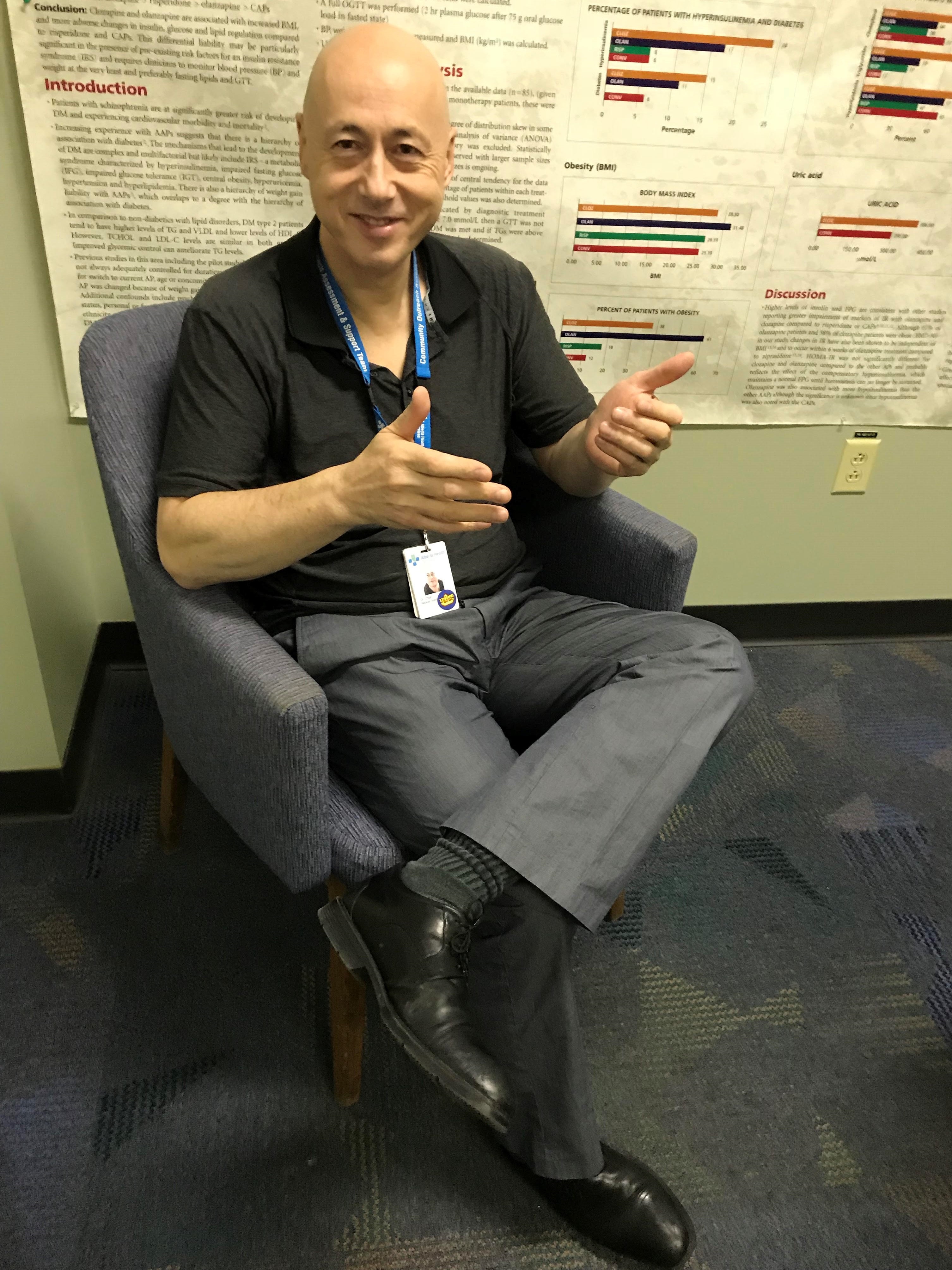
As Clinical Department Head for Addictions and Mental Health, Edmonton Zone, Dr. Pierre Chue oversees a wide range of AHS programs that touch the lives of thousands of patients every year.
"With my Dyad partner Mark Snaterse, we are charged essentially with running all of the programs pertaining to Addictions and Mental Health for the Edmonton Zone. That involves about 250 psychiatrists and approximately 500,000 patient contacts a year," he says.
"We probably serve at any given time about 10 per cent of the population of Edmonton, in some mental health capacity."
It's a demanding role, one that takes Chue all over the city and region, to homeless shelters, group homes, hospitals, and community clinics.
"Even though it's not as high-profile a program as say, cardiac transplantations, we're actually a very busy, busy program. We have 11 community mental health clinics reporting to Dr. Vincent Agyapong and three clinics reporting to Dr. Avininder Aulakh in Edmonton alone, with somewhere around 20,000 patients who are seen annually in those programs."
On a typical Saturday, Chue and other fellow Intensive Community Transition Team members often visit patients at inner-city homeless shelters including the Women's Emergency Accommodation Shelter and the George Spady Shelter and Detox.
"We'll see any patients there who have mental health issues. If we can keep them out of hospital by providing the care that's necessary, we're doing a good job in my view," he says. The same team also provides support to individuals with mental health issues being discharged from Alberta Correctional facilities.
"It doesn't really matter where they are, we'll see them anywhere to provide mental health care," says Chue.
"Many of them don't want to be in hospital, and don't want to come to the hospital. So we try to ensure that the locus of care remains in the community. We'll see them every day, provide them with proper medications, and connect them to resources."
Access Open Minds, run by Dr. Adam Abba-Aji, is another unique community-focused program. It focuses on providing better access to mental health services for teens and young adults.
"It's really quite an innovative national project. Edmonton is the only city with two participating sites, one at the Bill Rees YMCA on 105 Street, and the other at the U of A," says Chue. "So this is quite an achievement, both for Dr. Abba-Aji and for the Edmonton Zone."
To better oversee delivery of these many varied programs, while taking on related teaching and research roles, Chue is now based in the Psychiatry Department at University of Alberta Hospital. He also retains his primary AHS community office location on 108 Street, near the legislature.
"These are examples of zonal programs that have different components in different parts of the system, but we're very excited to be coordinating them out of the university. It's in keeping with the university being at the forefront of research and innovation, while continuing to maintain high standards of teaching."
So what prompted Chue to pursue a career in psychiatry in the first place?
"It certainly wasn't an early interest. I didn't enjoy it much when I was a medical student in the U.K.," he admits. "I did some surgery and some emergency medicine before enrolling in psychiatry, but there were a couple of things that drew me to it," he says.
"Number one, I was interested in neurology and neuropsychiatry when I was a resident. There was still a huge amount that wasn't known about the workings of the brain, so opportunities for research, discovery and development were far greater than in other specialties," he says.
"The other thing was the opportunity to make extraordinary changes in the quality of an individual's life, to change their outlook on life, and restore them to a level of functionality where they can re-engage with their family and loved ones," he adds.
"Every patient who has depression or schizophrenia is different. So you have to understand how people think, how they behave and how you can influence that. That's the therapy part. But you also have to have a very good knowledge of the powerful medications we use."
Chue's coordinating role in the Edmonton zone also entails regular presentations to other mental health professionals and government agencies.
"I've worked with Alberta Justice and given presentations to Community and Social Services, but mostly to other health professionals, specifically mental health professionals," he explains.
"I recently presented to a national diabetes conference in Edmonton at the Shaw Conference Centre. There is a significant link between depression and diabetes, on a neuro-biological level. We know that high blood sugar affects the sensitivity of the serotonin receptor, which is one of the receptors that controls mood, and the prevalence of depression in diabetics is about three to five-fold greater than in the general population," he says.
"We also suspect there might be some genetic vulnerability to developing both schizophrenia and diabetes, since we see a very high prevalence of diabetes in patients with schizophrenia."
Chue says one of the key organizational challenges he and Snaterse - AHS's Executive Director of Addiction and Mental Health - face is to improve the flow of patients through the whole system, and to ensure that there is proper follow-up and continuity of care.
"That's one of the reasons why we developed a mood and anxiety program and a complex psychosis program in the zone. Everyone does great work in their own area, but it's all too easy for things to fall apart at hand-off from one program to another," he says.
"So if you have to take responsibility for that person in the next step of the process, you're going to work very hard to make sure it goes smoothly. Of course, we are all under pressure and we don't have all the resources we need," he concedes.
"But the hand-off tends to be better because you remain responsible for all the patients."